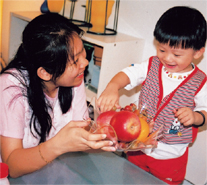Gastrointestinal problems, like stomach-ache, diarrhoea, bloating or vomiting, can make your child absolutely miserable. By keeping the system running smoothly, you can be sure his gut will be healthy and he will “go poopy” comfortably.
The gastrointestinal or digestive system is made up of many different organs, like the stomach, pancreas, liver, and small and large intestines. Just like any other part of the body, these organs need all the different nutrients from food to keep them going.
Nutrients (like carbohydrates, fat and protein) enable the tissues in these organs to form properly, regenerate, repair themselves, and have the energy to carry out their individual functions.
Every little process in the digestive system is regulated by the nervous system, hormones and enzymes, which need certain nutrients (especially vitamins and minerals) to be present. Sometimes, bacteria, viruses and parasites may get into your child’s digestive system as a result of unhygienic practices or contaminated food. Again, your child needs all the right nutrients of a balanced and varied diet so that his immune system will be strong enough to battle gastrointestinal infections caused by these nasty germs.
Occasionally, the digestive system seems to “go on strike”, causing your child to be constipated. This usually happens because your child does not have enough fibre or water in his diet. Fibre (found in fruits, vegetables, whole-grain cereal and cereal products, legumes and beans) provides bulk that softens the stools and makes your child pass motion more regularly.
A well-balanced diet, with a variety of foods, will help to keep your child’s gastrointestinal system healthy. Then he will be able to digest food properly, absorb the nutrients for other uses in the body and stay strong against infections.
CLEAN INSIDES
According to the Food and Agriculture Organization (FAO) and World Health Organization (WHO), food and waterborne diarrhoeal diseases, commonly caused by germs (like salmonella, campylobacter, V cholerae and E coli) kill an estimated 2.1 million people annually in developing countries.
When preparing and providing food for your child, it is very important to practise good hygiene and safety. Here are some tips you and your family can follow:
Tips for cooking
- Always wash your hands before and after handling food.
- Wash utensils and boards used in the preparation of foods. Use separate cutting boards and utensils for raw and cooked foods.
- Wash raw fruits and vegetables thoroughly before eating and cooking.
- Thaw frozen food in the refrigerator and cook it immediately after thawing.
- Do not leave raw or cooked food at room temperature for more than two hours.
- Cook foods thoroughly to kill any bacteria that may be present.
- Reheat cooked foods thoroughly to kill any bacteria which may have developed during storage.
- If you are not sure about the safety of a food, throw it away.
Tips for eating
- Everyone, especially children, should wash hands before eating!
- When choosing food stalls, restaurants or other eating places, make sure the staff, cutlery, equipment and environment look clean and tidy.
- If food, especially raw food, in a restaurant smells, looks or tastes odd, it should be returned.
Tips for storage
- Store raw foods at the bottom of the refrigerator, and cooked foods at the top.
- Wrap or properly cover food before storing.
- Do not put hot food in the refrigerator, as this will cause the temperature inside to rise.
- Store cans, packets and bottles in a cool, dry place, protected from insects, rodents and other pests.
Tips for shopping
- When buying fresh foods, make sure it looks, feels and smells fresh.
- Don’t buy foods where the packaging is damaged (dented or bloated cans, tampered safety seals, torn packaging) or which have passed their expiry (“best before”) date.
- If you buy foods that need to be chilled, go home as soon as possible and store it in the refrigerator or freezer.
GOOD BACTERIA FOR A HEALTHY TUMMY
Can bacteria be good for you? Scientists have found that certain types of bacteria in the digestive system, eg lactic acid bacteria (such as Lactobacillus acidophilus, Lactobacillus casei) and bifidobacteria, are actually beneficial for digestion and health.
These good bacteria are believed to be able to create an environment in the intestines that deters bad bacteria from growing. The good bacteria also improve digestion and increase the body’s ability to resist intestinal infection.
When these good bacteria are given as a supplement or added into foods, they are called “probiotics”. The most common foods that contain probiotics are yoghurt and certain fermented milk products.
Look for those that say “live culture” or “active culture” – but be warned that some products may claim to contain probiotics even though they contain only very small amounts. Probiotics are also available as pills, tablets and powders, but there is no need to give these to your child if he is eating a well-balanced diet. Ask your paediatrician or dietitian for advice.






Comments